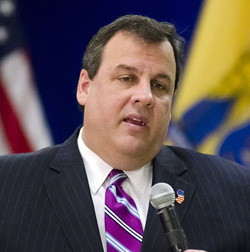Though only a few days have passed, to some who have been closely monitoring the online gambling law in New Jersey, last week may well have been a lifetime ago. That is, of course, owing to the fact that after many weeks of elevated chatter and speculation on the topic, the state’s Republican governor, Chris Christie, has issued a conditional veto on the legislation, which was passed by the state legislature at the end of 2012.
Under a definition provided by the New Jersey state legislature, a conditional veto is “a veto in which the Governor objects to parts of a bill and proposes amendments that would make it acceptable. If the Legislature re-enacts the bill with the recommended amendments, it is presented again to the Governor for signature.”
Insiders close to the situation had predicted a conditional veto as a likely possible outcome in the days leading up to the February 7 deadline, the date by which Christie would either have to veto the bill, sign it into law, or to allow the bill to automatically go into effect.
Christie, who vetoed a similar bill in 2011 amidst concerns about elevated problem gambling and a potential constitutional conflict, has requested changes that would set aside more funds to deal with the problem gambling issue. He has also requested increased taxes on the casinos and has called for a ten year limit on the law, after which it would expire and the issue would be re-examined by lawmakers at that time.
In his written conditional veto, Christie said, “It is my responsibility as governor to make these determinations, always mindful of my duty to guarantee the continued welfare of our families, our neighbors, and the future generations who will call our State home. With these goals in mind, I have concluded that now is the time for our State to move forward, again leading the way for the nation, by becoming one of the first States to permit Internet gaming. I authorize this step towards modernizing Atlantic City’s entertainment attractions cautiously, with carefully constructed limitations that will ensure the highest integrity and the most robust oversight.”
Powerful poker lobbying group the PPA, cheered Governor Christie’s actions, with the executive director of that group, John Pappas, saying, “While the New Jersey legislature has some work to do before this bill becomes law, we believe this is a victory for New Jersey residents who reached out to the Governor in droves expressing support for this bill.”
“Now, New Jersey is well positioned to serve as a leader in the innovative Internet gambling market and can pave the way for other states to adapt similar structures moving forward. We urge the legislature to act swiftly to pass this important legislation,” Pappas added.
It is expected that the legislature will vote to pass the changes by March 18, this according to one of the co-sponsors of the online gambling bill, state Senator Raymond J. Lesniak. When the new law takes effect, New Jersey will join the states of Nevada and neighboring Delaware to have adopted laws to allow for regulated online gambling.

